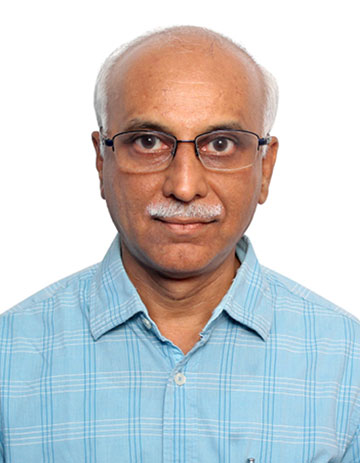
Nilesh J. Vasa
In this installment of Senior Member Insights, OPN talks with Nilesh J. Vasa, a professor in the department of engineering design at the Indian Institute of Technology Madras (IIT Madras), India. Vasa received a bachelor of engineering in production engineering in 1988 from Veermata Jijabai Technological Institute, India, and a master of technology degree in mechanical engineering in 1990 from IIT Madras. He received a doctorate of engineering in electronic device engineering from Kyushu University, Japan, in 1997. From 1997 to 2005, Vasa was a faculty member at Kyushu University. Since 2006, he has been a faculty member in the department of engineering design at IIT Madras.
Vasa has published over 125 papers in international journals and more than 250 papers in international conferences, and he holds more than three Indian patents. He set up the optomechatronics laboratory in the department of engineering design at IIT Madras. Vasa’s specific research interests include laser micromanufacturing, laser surface structuring, laser-assisted sensing, optomechatronics and biophotonics devices. He is a member of the Indian Laser Association, the Optical Society of India, the Japanese Laser Society, Optica and the International Society for Optics and Photonics (SPIE). He is an editorial board member of Scientific Reports.
What first interested you in pursuing science?
While pursuing my school projects concerning the environment, ecosystems, wildlife, etc., I became interested in learning more about science and technology.
In my high school days, I was involved in arranging visits to various industrial and science centers, and during summer vacation, I used to visit a manufacturing factory where my father was working. All these activities were stepping stones for generating interest in learning more about science.
My school teachers and parents were a source of inspiration for my inclination for science and subsequently my interest in engineering fields. In particular, with the help of an undergraduate professor, I had an opportunity to work under a professor at IIT in the development of a solid-state laser cavity. This inspired me to work in the area of optoelectronics.
What aspect of your current work do you find the most interesting or exciting?
“Curiosity and exploring approaches play a vital role in understanding physical phenomena.”
—Nilesh J. Vasa
I like experimental studies and validating the output via analysis. In particular, I find optics- and photonics-related experiments interesting, as they have many societal applications. Curiosity and exploring approaches play a vital role in understanding physical phenomena. Currently, we are working on laser-assisted sensing and micromanufacturing approaches. Engineering applications of these approaches are very exciting and satisfying, although challenging.
What tips for successful networking do you have for early-career professionals?
Participating in various workshops, meetings and conferences in your area of interest is useful for networking and research collaborations. Short-term visits to other institutes or organizations certainly broaden research horizons and networking opportunities. Forming a team of members working together also assists in enhancing networking.
What professional resources do you rely on to stay active and engaged with your field?
I found that participating in workshops and conferences plays a significant role in staying active and engaged in my field of interest. Membership in professional societies also provides an opportunity to learn about recent progress and research collaborations. Journal publications are essential to learn about solutions and research challenges concerning your field of interest.
What skills do you think are most important for someone interested in a career like yours?
An academic degree in a doctoral program certainly plays a vital role in building a career in academia and research organizations for professional growth. An interdisciplinary approach is useful while working toward applied research areas. The research field matching contemporary needs attracts young student minds and helps in building a better research laboratory. Writing project proposals and executing them successfully via research grants from research foundations or industry are important and useful for sustaining research activities.
What advice do you have for young scientists who are discouraged about their current work or career path?
Pursuing research ideas with dedication and faith certainly helps overcome challenges concerning the outcome of your research work and career path. Sometimes short-term courses, workshops and interdisciplinary research interactions are useful in reskilling ourselves to enhance our output.
Sponsored research and/or industry research collaborations are essential in sustaining the research environment and enhancing the interest of research students working in the environment. Planning research activities and goals for the next five to ten years (long term) helps in deriving short-term activities and involvement.
What is one piece of advice that you wish you were given as a student/early in your career?
“Research interactions with other research teams are useful to enhance outcomes and overcome challenges and fears encountered during various academic and research activities.”
—Nilesh J. Vasa
I realized later that research interactions with other research teams are useful to enhance outcomes and overcome challenges and fears encountered during various academic and research activities.
What has been the most motivating factor throughout your career?
To work on challenging research problems and their applications for societal use are motivating factors in my career. Of course, I have not succeeded many times, but I have pursued my goals with curiosity and dedication.
What habits do you frequently rely on that help you to succeed?
I keep learning through failures, reading and interactions with others, including students. I accept failure as a stepping stone toward achieving life goals. I sometimes seek the help of others when necessary. Being on the residence campus, I take part in institute-related activities and go cycling on campus.
If your ten-years-younger self was looking at your career now, what would he/she be most surprised by?
If my ten-years-younger self was looking at my career now, he would be surprised by my confidence in progressing my research activities in spite of many failures!
